All Nonfiction
- Bullying
- Books
- Academic
- Author Interviews
- Celebrity interviews
- College Articles
- College Essays
- Educator of the Year
- Heroes
- Interviews
- Memoir
- Personal Experience
- Sports
- Travel & Culture
All Opinions
- Bullying
- Current Events / Politics
- Discrimination
- Drugs / Alcohol / Smoking
- Entertainment / Celebrities
- Environment
- Love / Relationships
- Movies / Music / TV
- Pop Culture / Trends
- School / College
- Social Issues / Civics
- Spirituality / Religion
- Sports / Hobbies
All Hot Topics
- Bullying
- Community Service
- Environment
- Health
- Letters to the Editor
- Pride & Prejudice
- What Matters
- Back
Summer Guide
- Program Links
- Program Reviews
- Back
College Guide
- College Links
- College Reviews
- College Essays
- College Articles
- Back
Chess
Chess: the sport of the intellectuals. It’s quite remarkable how a lackluster pattern of black and white tiles set into a less than ordinary square board can stretch the minds of the ingenious to their extremes. Perhaps the most intriguing element of chess is that between the clear-cut lines of black and white, it is the player that creates the grayness.
Most things in life are too complex. As someone who scores highly in the ‘intelligence’ department, I can tell you that much of the allure of mathematics is the existence of a definite answer - even the ‘ambiguous case’ isn't truly ambiguous. Those of us who have the gift (or burden - call it what you may) of high intelligence tend to be quite perceptive; its almost too easy for us to read between lines right into the complexities of life. So, many of us choose to turn our attention to more simplistic things, those that don't frustrate us or suffocate us with the constant cloud of uncertainty.
Right. Chess. The beauty of chess is its simplicity: you're either a black player or a white one, each tile is either black or white, each tile is also equal in every way to every other tile, and the board is a perfect square. What makes chess complicated, or ‘gray’, is where we choose to move our pieces. In other words, we define our own limits. No pre-existing social stigmas, norms or expectations to confine us. Beautiful. We are, quite literally, the pawns of our own, self-generated kingdoms.
But, we’re humans so naturally, we kill the beauty. We start as kings and end as pawns. Our careful consideration, our anxious anticipation, our prideful predisposition causes us to base our ourself around our opponent. If we focused more on winning the war than outdoing the opponent, our blurred vision would become crystal clear. Chess is about beating a king, not the king. As with everything else in life, we often let our external history with the opposing individual trick us into thinking as people not players. Now, chess is another conflict between minds as opposed to the intellectually stimulating puzzle it was invented as. There, we turned the beauty into the beast. Again.
We’re an eternally flawed species. Those of us who distract ourselves with simplicity or actually just channeling our inner-conflict onto a different platform - one where we decide the discord. We let our hubris grow as we deceive ourselves into believing we’re beyond petty struggles. We take diamonds and find a way to shatter them.
Ultimately, we’re faced with a decision. We can continue to channel and sublimate our complexity into simpler outlets. Or, we can set aside the stigma against a ‘smart’ individual being ‘difficult’ and discuss our conflict. Hubris or happiness?

Similar Articles
JOIN THE DISCUSSION
This article has 0 comments.

It's funny how we often see things as 'black' or 'white' - what about the 'gray'?